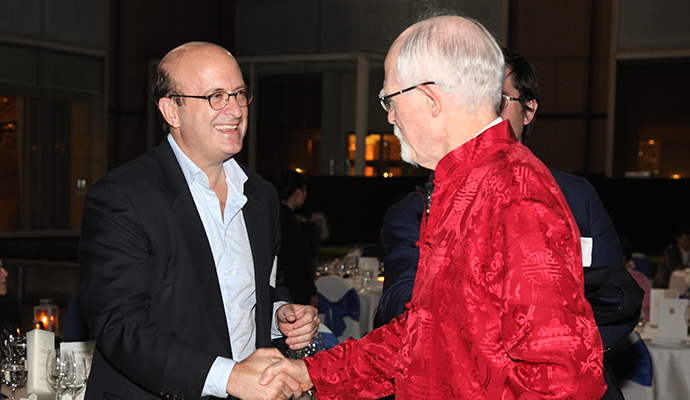At the Center of it All
Tim Steinert ’89 (pictured left) with Professor Emeritus Randy Edwards at a 2014 celebration held in Edwards’ honor in Beijing. |
Tim Steinert ’89 was working as an English teacher in Taiwan when he decided to go to law school. When he asked lawyers at top firms in Hong Kong for recommendations, one institution stood out as the best place to pursue his interests in China and international relations: Columbia Law School.
“Columbia was the leading school that combined law and China,” he recalled. “And Professor [R. Randle “Randy”] Edwards was the leader of that effort.”
Specifically, Edwards, now the Walter Gellhorn Professor Emeritus of Law, was the founder and director of Columbia Law School’s Center for Chinese Legal Studies, an interdisciplinary hub of academic, extracurricular, and student-professor exchanges that has served as a bridge between the Chinese and U.S. legal communities for more than 30 years.
Steinert said the exposure the center provided to Chinese law was “key” to the start of his legal career. After graduating from the Law School, he joined Coudert Brothers in Beijing before moving to Davis Polk & Wardwell and Freshfields Bruckhaus Deringer in Hong Kong. In 2007, he became general counsel of the Alibaba Group, a China-based e-commerce company that, in 2014, had a record-breaking debut on the New York Stock Exchange.
“I think it is absolutely essential that people in the profession have the encouragement to work overseas and in areas that can improve relations between the U.S. and other countries,” said Steinert, who gave a substantial gift to the Professor R. Randle Edwards Fund in 2016 to both honor Edwards and help provide permanent support for the Center for Chinese Legal Studies.
When Edwards first proposed the idea of the center in the early 1970s, the U.S. had no formal diplomatic relations with mainland China. Still, Edwards arranged for seminars and talks by leading Chinese law scholars and professionals. One of his first speakers was Charles Freeman, who worked as chief interpreter during President Nixon’s historic visit to China in 1972. Once diplomatic relations began in 1979, the center helped bring Chinese students to campus and continued to add extracurricular offerings.
“I operated on the assumption that my students would be on the cutting edge, sitting down to meetings with Chinese lawyers and government officials,” Edwards said. “Tim was one of the most active students in the program.”
Under the leadership of Benjamin Liebman, the Robert L. Lieff Professor of Law, who took over as director in 2002, the center has continued to grow. Today, the Law School accepts 10 to 15 J.D. students, 30 to 35 LL.M. students, and 20 visiting scholars from China each year.
Steinert said that’s exactly the sort of collaboration that should be supported, adding that some of his closest friendships and business relationships started at the Law School and through the center in particular.
Columbia Law School Dean Gillian Lester, the Lucy G. Moses Professor of Law, said Steinert is an excellent ambassador for the Law School and the Center for Chinese Legal Studies, adding that the school looks forward to building on the momentum of his gift.
“There are now generations of alumni who have benefited from Columbia Law School’s global history, and Tim Steinert is a shining example,” she said. “We are fortunate to have him as part of our community.”
Liebman agreed.
“It speaks volumes about Tim that, at one of the most important and dynamic companies in China, the general counsel is an American,” he said. “That skill set requires someone who is completely at home in multiple different legal systems. If we can train students to have that skill set, then we’re doing a good job.”
In addition to Edwards, Steinert said he was inspired in the classroom by international law greats including Professor Richard N. Gardner and the late Professors Oscar Schachter and Hans Smit. He said he felt encouraged—and equipped—after his time in Morningside Heights to go to work directly in China, and he turned down offers in Washington, D.C., and New York to do so.
Columbia Law School, he added, “was the perfect storm of my interests and academics.”
Steinert’s generosity isn’t limited to fundraising. He has visited campus to speak to students and, for the past few years, has hosted rising 2Ls as summer interns in Alibaba’s legal department, cultivating for others the same cross-cultural experience that helped launch his career.
“Communication and contact with different people open up opportunities,” he said. “The center and programs like that are a tremendous contribution to progress in international relations.”
###
Posted January 23, 2017
